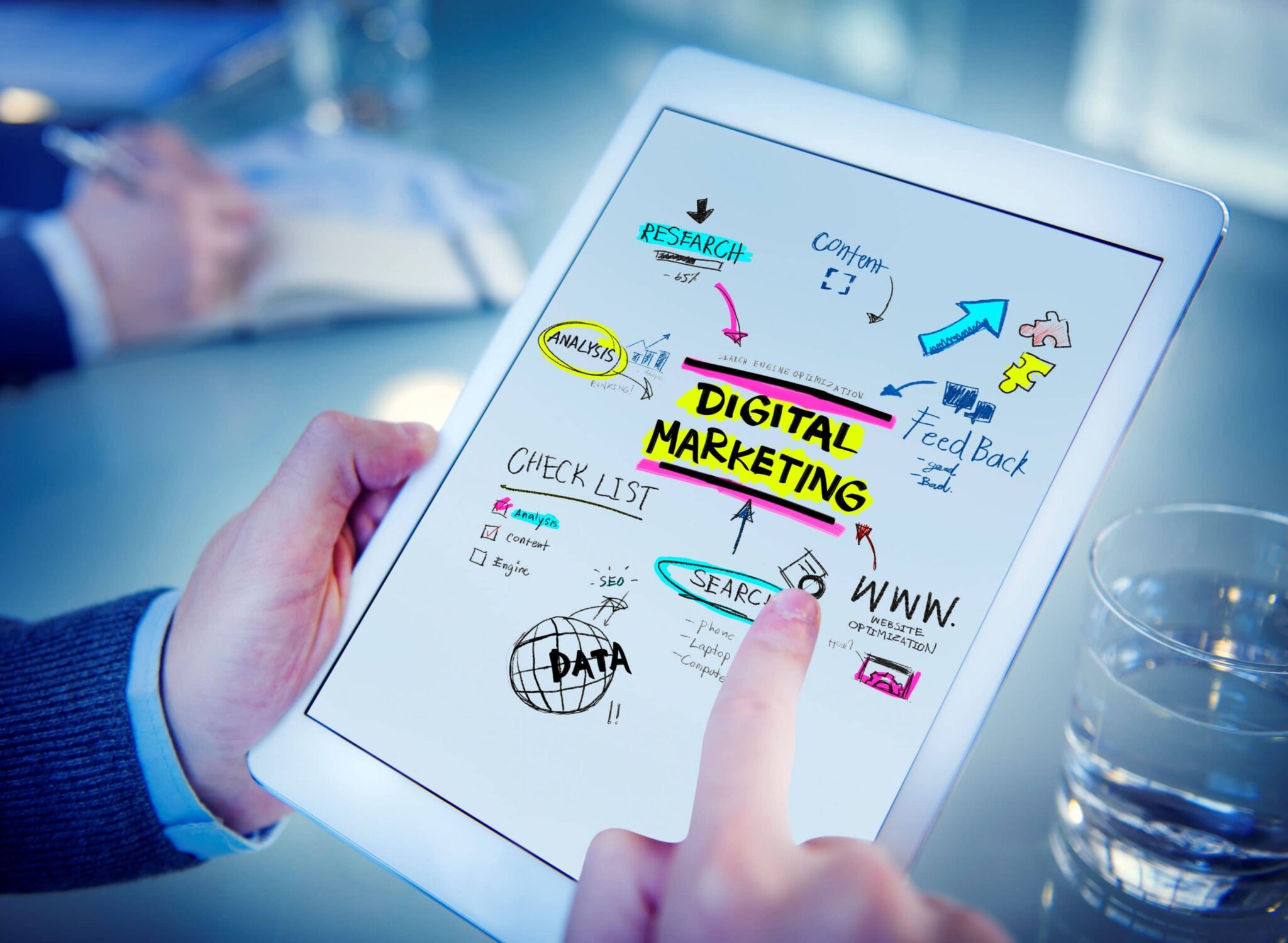Digital Marketing in the rapidly evolving business landscape, digital marketing has emerged as a cornerstone for success. This powerful tool has transformed how businesses interact with their customers, driving growth, and increasing visibility in an ever-competitive market. “Revolutionizing Business: The Power of Digital Marketing in the Modern Era” delves into the intricacies of digital marketing, its evolution, key components, benefits, and future trends, providing a comprehensive guide for businesses looking to harness its potential Digital Marketing.
The Evolution of Digital Marketing
Digital marketing has significantly evolved since its early days.The journey began with simple online advertisements and has now evolved into a sophisticated, multi-faceted approach that includes SEO, content marketing, social media, email marketing, and more. The advent of the internet and technological advancements have continuously reshaped digital marketing strategies, making them more targeted and efficient.
The rise of social media platforms, the proliferation of mobile devices, and the advent of big data analytics have all contributed to the sophistication of digital marketing. Today, businesses can reach their audience with unprecedented precision, delivering personalized messages that resonate and drive engagement.

Key Components of Digital Marketing
Search Engine Optimization (SEO)
SEO is the backbone of digital marketing, ensuring that your content is visible to search engines and, consequently, to potential customers. By optimizing your website and content for relevant keywords, you can improve your search engine rankings, driving organic traffic to your site. Effective SEO involves on-page elements like meta tags and keyword optimization, as well as off-page tactics such as backlink building and social media engagement.
Content Marketing
Content marketing focuses on producing and sharing valuable, relevant content to attract and engage a specific audience. This includes blog posts, articles, videos, infographics, and other forms of media.Quality content not only drives traffic but also builds trust and authority in your industry. A well-executed content marketing strategy can significantly boost your brand’s visibility and credibility.
Social Media Marketing
Social media platforms like Facebook, Twitter, Instagram, and LinkedIn offer businesses unique opportunities to connect with their audience. Through regular posts, targeted advertisements, and interactive content, businesses can foster relationships, drive engagement, and increase brand awareness. Social media marketing is also an excellent way to gather feedback and insights from your audience, allowing for more personalized and effective marketing strategies.
Email Marketing
Email marketing continues to be one of the most effective strategies in digital marketing. By sending targeted emails to your subscriber list, you can nurture leads, promote products, and keep your audience informed. Personalization and segmentation are key to successful email campaigns, ensuring that each recipient receives content that is relevant to their interests and needs.
Pay-Per-Click Advertising (PPC)
PPC advertising enables businesses to display ads on search engines and other platforms, paying a fee for each click on the ad. This method can drive immediate traffic to your website and is highly effective for reaching specific audiences. PPC campaigns can be finely tuned through keyword selection, ad placement, and budget management, making them a flexible and powerful tool in your digital marketing arsenal.
The Benefits of Digital Marketing
Digital marketing offers a multitude of benefits over traditional marketing methods. Some of the key advantages include:

Cost-Effectiveness
Digital marketing campaigns are often more affordable than traditional marketing methods, offering a higher return on investment.
Measurability
Digital marketing allows for precise tracking and analysis of campaign performance, enabling businesses to measure success and adjust strategies accordingly.
Targeting
With digital marketing, businesses can target specific demographics, geographic locations, and even individual behaviors, ensuring that their messages reach the right people.
Engagement
Digital marketing facilitates direct interaction with customers, fostering relationships and building loyalty.
Global Reach
The internet provides a platform for businesses to reach a global audience, breaking down geographical barriers.
Implementing a Digital Marketing Strategy
Setting Goals
The first step in any digital marketing strategy is setting clear, achievable goals. These might include increasing website traffic, generating leads, boosting sales, or enhancing brand awareness. Well-defined goals provide direction and a basis for measuring success.
Identifying Target Audience
Understanding your target audience is crucial. This involves researching demographics, preferences, and behaviors to create detailed buyer personas. Knowing your audience helps tailor your marketing messages and choose the most effective channels for reaching them.
Choosing the Right Channels
Not all digital marketing channels will be suitable for every business. It’s important to select the channels that align with your goals and audience. For example, B2B companies might focus on LinkedIn, while B2C businesses could benefit more from Instagram or Facebook.
Creating Engaging Content
Content is at the heart of digital marketing. Creating high-quality, engaging content that addresses the needs and interests of your audience is key to driving engagement and conversions. This may involve blog posts, videos, social media updates, and more.
Analyzing and Adjusting
Digital marketing is an iterative process. Regularly analyzing the performance of your campaigns helps identify what’s working and what’s not. Tools like Google Analytics and social media insights provide valuable data that can inform adjustments to improve results.
Common Challenges and How to Overcome Them
Keeping Up with Trends
Digital marketing is continuously evolving, with new trends and technologies emerging frequently.Staying informed and adaptable is essential. Staying updated by subscribing to industry blogs, attending webinars, and engaging in professional networks can keep you informed.
Measuring ROI
Measuring the return on investment (ROI) for digital marketing can be challenging. It’s important to set up proper tracking mechanisms and use analytics tools to monitor performance. Defining clear metrics and KPIs from the outset will also aid in assessing ROI.
Creating Quality Content
Consistently producing high-quality content can be resource-intensive. Developing a content calendar, leveraging user-generated content, and repurposing existing content are strategies that can help maintain a steady flow of valuable content.
Managing Multiple Channels
Handling multiple digital marketing channels can be overwhelming. Utilizing marketing automation tools and integrating your channels can streamline efforts and ensure a cohesive strategy.
Future Trends in Digital Marketing
Digital marketing is poised to continue its evolution, with several emerging trends set to shape its future:
Artificial Intelligence and Machine Learning
AI and machine learning are transforming digital marketing through the facilitation of more personalized and efficient campaigns. Predictive analytics, chatbots, and personalized content recommendations are just a few applications.
Voice Search Optimization
As smart speakers and voice assistants gain popularity, optimizing content for voice search is growing in significance. This includes prioritizing natural language queries and long-tail keywords.
Video Marketing
Video content is more popular than ever, with platforms like YouTube and TikTok dominating. Live streaming and interactive video content are also gaining traction.
Influencer Marketing
Partnering with influencers can amplify your reach and credibility. Micro-influencers, in particular, offer high engagement rates and authentic connections with niche audiences.
Augmented Reality (AR) and Virtual Reality (VR)
AR and VR are creating immersive marketing experiences, from virtual try-ons to interactive product demos, enhancing customer engagement and experience.

Conclusion
Digital marketing is an indispensable tool for modern businesses, offering unprecedented opportunities for growth and engagement. By understanding its key components, benefits, and the steps to implementing an effective strategy, businesses can harness the power of digital marketing to revolutionize their operations. As technology continues to advance, staying ahead of trends and adapting to new tools and techniques will be essential for sustained success Digital Marketing.
FAQ
What is digital marketing?
Digital marketing encompasses all marketing efforts that use an electronic device or the internet. It leverages digital channels such as search engines, social media, email, and websites to connect with current and prospective customers.
Why is digital marketing important?
Digital marketing is important because it allows businesses to reach a larger audience, target specific demographics, track performance, and achieve a higher ROI compared to traditional marketing methods.
How can I improve my SEO?
Improving SEO involves several strategies, including optimizing website content for relevant keywords, building high-quality backlinks, improving site speed, and ensuring your site is mobile-friendly.
What role does content play in digital marketing?
Content is crucial in digital marketing as it attracts, engages, and converts visitors. Quality content helps establish authority, build trust, and drive organic traffic through SEO.
How do I measure the success of my digital marketing campaigns?
Success can be measured using various metrics such as website traffic, conversion rates, click-through rates, engagement levels, and ROI. Tools like Google Analytics and social media insights can provide valuable data.
What are the most effective digital marketing channels?
The most effective channels vary depending on the business and its audience. Commonly effective channels include SEO, content marketing, social media, email marketing, and PPC advertising.
How often should I update my digital marketing strategy?
Your digital marketing strategy should be reviewed and updated regularly to adapt to changes in your business, audience preferences, and the digital landscape. Quarterly reviews are a good practice, with more frequent adjustments as needed.
 Daily Blogger News Stay updated with the latest trends and insights. Your reliable source for daily updates and information.
Daily Blogger News Stay updated with the latest trends and insights. Your reliable source for daily updates and information.






